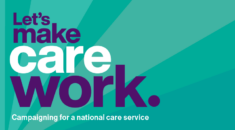Care workers have quietly kept the country running for decades, overworked and underpaid.
The COVID-19 pandemic has forced carers into life-threatening working conditions, and UNISON is fighting to raise their wages.
Sian Stockham works as a carer for people with learning disabilities in Abergavenny, Wales, and also as a support worker in a reablement and rehabilitation resource centre.
“I’m lucky to have a job, and one that I love,” she says. “There is absolutely no work that is more important – caring for people like you would your own and making them comfortable in some of the hardest moments of their life.
“But I’m 66 and I can’t afford to retire. I’ve still got to work two jobs.”
She says that within the sector the turnover is phenomenal. “I don’t think people realise how much responsibility the job is, how much of yourself you have to put into it.”
Sian’s day starts at 7am and often finishes at 10 at night, and sometimes her shifts involve sleep-ins. “I never know what my day’s going to be, no two hours are the same. But you always go to work and hit the ground running.
“In one of my roles, I look after ladies who live in the same accommodation. They need care 24 hours a day, 7 days a week, and I do shift work in a team.
“I provide care, but also support them to develop skills so they can live a more independent life and make their own life choices.
“I have to get them up, administer all their medication, which is a massive responsibility, and address their personal hygiene. It’s a big task, and I’m always juggling a lot of paperwork because I have to keep a record of what progress people are making.
“There are other times where I’ve had to sit with somebody who’s dying at end of life, and in my other role, I’ve had to call 999 and administer CPR.”
Exhausting but exhilarating
Amidst all of the strain and challenge, Sian loves her job: “It’s exhausting, but there’s also an exhilaration if you’ve achieved something – if you’ve got somebody to do something that they’ve never done before or mastered something they’ve been trying to do for a long time.
“One person I worked with couldn’t even turn the cooker on, but in 18 months they had learned how to prepare their own meals.”
Despite the number of people whose lives depend on Sian, she earns just £8.72 an hour, which is why she’s pushing for all carers to be paid a real, living wage of £9.50 an hour (£10.85 if they live in London).
“We do a valuable job that lots of people can’t do. It’s a really important job. It’s not about wiping somebody’s backside. Yes, we do that if we need to, but we do lots of things that are far more important than that.
“It’s not appreciated. People think, ‘Oh, just going into people’s houses to have a chat to them’. No! You’re going into people’s houses that might not have seen anyone for 24 hours.
“You’re the difference between them seeing and speaking to a fellow human being or being absolutely isolated.”
‘Clapping doesn’t feed me’
The UK’s 1.6 million carers are the centre point of communities. Their role has been amplified within COVID-19, as social distancing has left thousands of people completely isolated, with carers as the only point of human contact.
As Sian describes: “People haven’t been seeing their family. If families visit, they have to stand outside the window. Carers like me are the only physical being that’s been inside to see someone for months.”
Though the public has recognised this vital work through the weekly ‘clap for carers’, Sian wants the government to step up its commitment.
“Clapping doesn’t feed me,” she says. “It doesn’t put a roof over my head, it doesn’t keep me warm. Everyone claps on a Thursday and by Friday, it’s all forgotten. It’s a nonsense – and we’re all being made to pay because of the shortcomings of the government and their failure to act sooner.
“If I had a pay rise it would make a massive difference to me, and to my local area. We spend 90% of our wages in our local area. The more we earn, the more we’re able to spend, and that’s all going into the local economy.”
Latest figures show that 27% of care workers are over 55. Many of them are in Sian’s position – unable to retire.
Alongside unions, charities and the Future Social Care coalition, Sian has set up started a petition to parliament that demands fair pay for carers.
UNISON general secretary Dave Prentis say: “Applause and appreciation do not replace pay and practical support for our public service workers – the people who are keeping our communities, our country, running.
“No amount of clapping will drown out our calls for an end to poverty pay and safe working conditions for all our members – and for all key workers.”
UNISON general secretary-elect Christina McAnea adds: “Ministers say they appreciate care workers, but gratitude won’t keep the wolf from the door.
“Care can be tough, emotionally exhausting, highly skilled work. But care workers are underpaid, poorly treated, and undervalued.
“The government must end the care crisis by showing it’s ready to end a bargain-basement service that puts profits above care and treats staff like numbers on a spreadsheet.
“The UK urgently needs a fully funded national care service with fair pay, extensive training and a proper career structure for its dedicated workforce.
“Care workers’ value must be reflected in their pay. They must be paid the real living wage, as an absolute minimum.”




I am writing in response to the article The Care Scandal (Sian Stickham U Spring 2021). While I would strongly support many of the points made in the article I was horrified to read (page 28) ‘It’s not about wiping somebody’s backside. Yes we do that if we need to but we do lots of things that are far more important than that.’ My question is what is ‘far more important’ than helping someone meet their intimate care needs and doing this respectfully and allowing the person their dignity. Should I be in a position where I need help to manage my continence needs I desperately hope that I do not encounter a carer who feels they have far more important things to do.